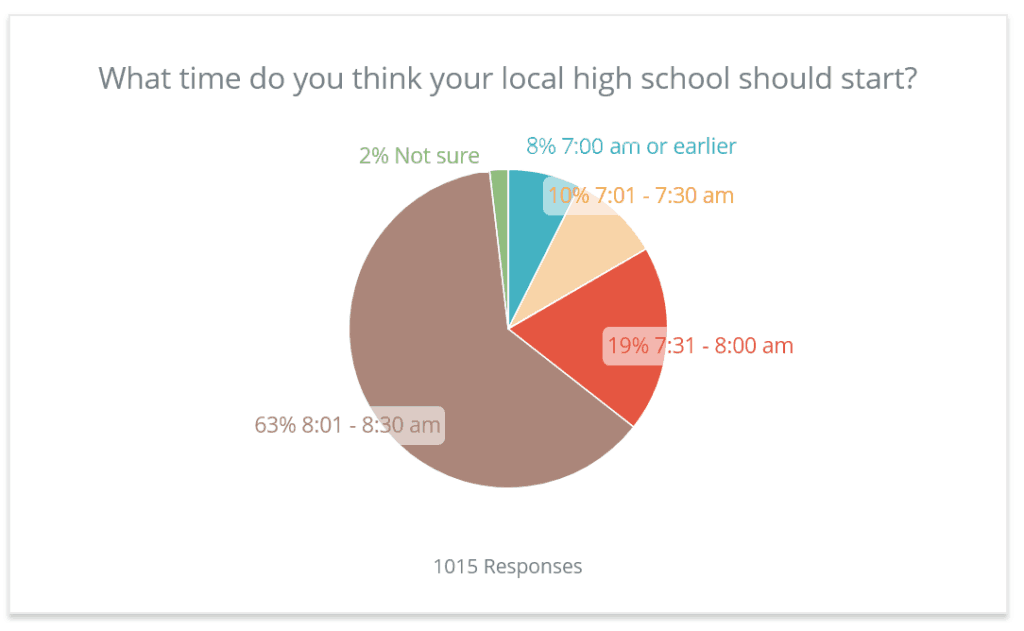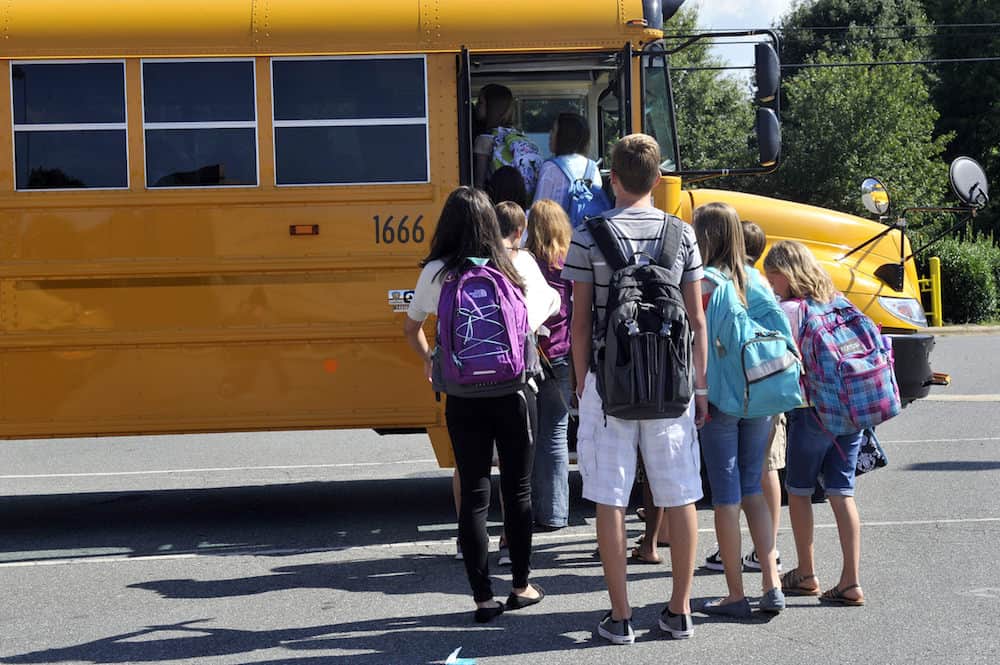If you have ever wondered why it is so hard to get teenagers out of bed in the morning, you can blame their biology. Among other biological changes, adolescents experience changes in their sleeping patterns.
Delays in the secretion of melatonin— the hormone that helps you fall asleep— mean adolescents have a hard time falling asleep before 11:00 PM. Because they need 8.5 to 9.5 hours of sleep every night, getting up before 7:30 a.m. goes against their biological clocks.
Yet many high school students are required to be in class at 7:30 a.m. or earlier, resulting in sleep deprivation.
The consequences of sleep deprivation can be severe. According to the American Academy of Sleep Medicine, adolescents who do not get enough sleep are more likely to be overweight, not engage in physical activity, suffer from symptoms of depression, perform poorly in school, and engage in risky behaviors like smoking, drinking, and using drugs. Additionally, sleepy teenagers are more likely to get into car crashes.
As a result of these negative consequences, the American Academy of Pediatrics recommends middle and high schools start no earlier than 8:30 a.m.
Research shows students and society benefit when school starts later
What happens when schools follow that recommendation and push start times later than 8:30 a.m.? The Center for Applied Research and Educational Improvement from the University of Minnesota published a study in 2014 that looked at more than 9,000 students in three states.
They found more than 60 percent of students get at least eight hours of sleep a night at schools that start at 8:30 a.m. or later, compared with about 33 percent of students at schools that start at 7:30 a.m.. Later start times were associated with improved academic performance, including grades and standardized test scores, attendance, and tardiness. Finally, the researchers found that shifting school start times from 7:35 a.m. to 8:55 a.m. reduced the number of car crashes for teenagers by 70 percent.
The Rand Corporation studied the economic effect of shifting start times to 8:30 a.m. and found huge economic benefits of starting school later. The study estimated the costs and benefits to 47 states of moving school start times to 8:30 a.m. and found that within just two years, the benefits of later start times outweigh the costs, providing an economic gain to the US economy of $8.6 billion. After 10 years, this would increase to $83 billion and after 15 years, $140 billion.
Furthermore, they argue that these estimates are conservative, since they only used benefits that were easily quantifiable such as higher academic performance and fewer car crashes. They did not estimate the effects of lower rates of depression and mental health issues and increased obesity, all of which are associated with sleep deprivation.
School start times in North Carolina
The Education Policy Initiative at UNC-Chapel Hill examined high school start times in North Carolina for the 2011-12 to 2014-15 school years and found the average high school start time was 8:00 a.m., consistent with an average high school start time of 8:03 a.m. nationally.
Of the schools in their sample (which excludes early-college, alternative, special education, vocational, and hospital schools), 17 percent started before 7:30 a.m., 22 percent started between 7:30 and 7:59 a.m., 40 percent started between 8:00 and 8:29 a.m., and 21 percent started at 8:30 a.m. or later.
When broken down by student enrollment, however, schools that start before 7:30 a.m. have an average enrollment of 1,548 students compared to 881 for schools that start between 7:30 and 7:59 a.m., 831 for schools that start between 8:00 and 8:29 a.m., and 1,082 for schools that start at 8:30 a.m. or later.
Schools that start much earlier or much later are more likely to be urban school systems with more students, requiring multiple rounds of busing in the morning and afternoon. The report notes that many Charlotte-Mecklenburg and Wake County high schools start before 7:30 a.m. whereas Cumberland County, Guilford County, Winston-Salem Forsyth, Chapel Hill-Carrboro and Durham high schools start after 8:30 a.m.
What do North Carolinians think?
It seems like a slam dunk for school administrators to start high schools later — fewer tardies, absences, and car crashes and better student performance — who would not want that? However, shifting school start times is more complicated than it may seem.
For larger, urban school systems like Wake County that use the same buses for high school, middle, and elementary students, shifting high school start times requires either getting more buses and drivers or moving elementary and middle start times earlier. With so many competing demands for funds, school administrators often cite the cost of purchasing additional buses and drivers as the reason why they can not shift high school start times later. In Wake County, Apex High is starting at 7:10 a.m. this year due to bus driver shortages.
Starting high school later also inevitably moves the school day later, cutting into time many students use for extracurriculars, homework, or working a job. Students and parents may want school to start later but do not see how they can fit everything in if it does.
In a recent question set distributed by Reach NC Voices to North Carolina citizens, more than 60 percent of respondents thought their local high school should start after 8:00 a.m.

When asked why high school should or should not start later, many respondents cited the research showing better student health and performance when schools start later:
“When high schools start too early, teens are tired all the time. Teens are healthier and less likely to get into car accidents on the way to school when school starts later and they get enough sleep. Their body clocks naturally keep them up late, so they can’t just go to bed earlier. We need later high school start times in Wake county!”
“Kids are not responsive or awake at 5:30 in the morning. No one should have to be unless they desire to be. Kids waiting for the buses are standing out on the roads in the dark during the months of fall and winter. Its shameful.”
However, not everyone agrees that start time should be later, especially if it means less time after school for work or extracurricular activities. While a majority (57 percent) of respondents reported that they would be supportive of high school starting later if it meant less time for extracurriculars after school, one-third of respondents said they were not supportive of a later time.
Respondents cited jobs, sports, homework, time with family, and the pressures of getting into colleges as reasons they do not support later start times:
“They shouldn’t start later because high school students need those extra activities in order to apply to colleges. So if they are involved in activities then they need that time to also excel at those too. High school kids need those requirements to have an higher education.”
“[School] should start [as] early as possible to have time at the end of the day with family.”
“Extracurricular activities are extremely important to many student athletes, as well as other clubs and organizations. It also makes it easier for kids who have to work, gives them some time for homework and other activities.”
Durham schools change start times; too soon to see results
Some schools are heeding the medical advice and starting high school later. In 2015, the Durham school board voted to push high school start times to 9:00 a.m. and elementary school start times to 7:45 a.m.
It is not clear whether parents are happy with this change after one year, however. A survey by the Education Policy Initiative at UNC-Chapel Hill found 53 percent of high school parents prefer the old schedule with only 27 percent wanting to keep the new schedule. High school staffers feel similarly: 53 percent want to return to the old schedule and 28 percent want to keep the new start times.
One Durham high school student responded to the Reach NC Voices question set and said:
“As a student, in the Durham Public School system, we get out of school at 4:00 p.m., which is ok if you have no sports, job, volunteering, or activities outside of school. I remember when we started at 7:30, yes it was early, but we got out at 2:30, giving us students plenty of time to do stuff outside of school. I don’t care what studies say about my brain, I don’t even get more sleep! I have yet to go to sleep before 11:45 p.m. any school night, if anything us students are just staying up later and getting less sleep.”
Despite the Education Policy Initiative survey results, the Durham school board does not plan to change start times back to the old schedule, saying too few people responded to the survey and more time is needed to evaluate the impacts of the change.



